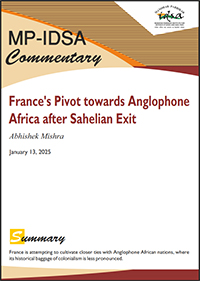France’s Pivot towards Anglophone Africa after Sahelian Exit
- January 13, 2025 |
- IDSA Comments
Over the last few decades, Africa’s Sahel has emerged as one of the most coup-prone regions of the world owing to several reasons. Ineffective systems of governance that lack public credibility and capacity to prevent violent conflicts, ineffective democratic systems, endemic poverty, foreign interference, harsh climatic conditions and unconstitutional extension of presidential term-limits, have all contributed to the region’s deteriorating security conditions. Extremist groups continue to flourish in the region and new plurilateral arrangements like the Alliance of Sahelian States (AES) between Mali, Niger and Burkina Faso have emerged.
At the centre of these developments is the rising anti-French sentiment among local populace and waning Western influence in the Sahel.1 In West Africa, France is the pre-eminent imperial power. In the late 2000s, when France launched its war on radical Islamic terrorism, there was initial optimism surrounding French intervention. The war began with Operation Sabre (2009), and Serval (2012–2014) and Epervier (1986–2014) and ended with operations Takuba (2020–2022) and Barkhane (2014–2022).
To an extent, these operations were initially successful in curbing growing extremism and violent acts in the region. However, the optimism surrounding French and European military involvement in region dissipated over time owing to several strategic errors and miscalculations.2 These included the use of armed drones and French aid and support in the development of military tools and equipment for corrupt, undemocratic regimes.
The anti-French vitriol is not just a legacy of French colonialism or the failure of French security personnel to address the root causes of insecurity and curb violent extremism, but also due to the legacy of French economic policy towards its former colonies evidenced by the continued usage of CFA franc by several Francophone West African nations.3
Across francophone West Africa, analysts note that
putschists have weaponized genuine criticism of French support for deeply unpopular or illegitimate regimes in a system known as Francafrique to justify what are essentially careerist coups.4
The pattern of coups in Sahel indicate that the systems of governance in the Sahel were not effectively democratic as their colonial legacy created artificial states and lacked the public credibility and capacity to prevent conflicts. Large youth populations’ aspirations for economic opportunity and political voice continue to remain unmet.
France’s Fragile Position in Africa
France’s colonial past has meant that it
carries several burdens in West Africa that weighs on its ability to defend itself against the advances made by a broader authoritarian movement, partly driven by Russia, that challenges democracy and democracy’s advocates.5
French President Emmanuel Macron is facing a dual crisis of legitimacy both at home and abroad.6 At home, the fall of the government led by Prime Minister Michel Barnier on 4 December 2024 following a vote of no-confidence showcases his administration’s unpopularity. Internationally, Macron is witnessing the erosion of France’s once dominant influence in Francophone Africa.
Ivory Coast became the latest in a slew of countries in West Africa to ask French forces to leave their country. President Alassane Ouattara announced his decision to “withdraw French defence forces in a concerted manner by end of 2025” to help modernise the country’s armed forces.7 Before that, in late November 2024, Chad terminated its decade-long defence pact with France8 which was followed by an announcement hours later by Senegalese President Bassirou Faye of his country’s intention to end the presence of foreign militaries before the end of 2025.9 The loss of Chad was a setback to France as the country served as a cornerstone of France’s military strategy in Africa, enabling the projection of power into Libya, Central Africa and Sahel.
Before Ivory Coast, Chad and Senegal, it was the Alliance of Sahel States (Mali, Niger and Burkina Faso) that were the first to sever ties with France. Following the departure of a 4,500 strong Operation Barkhane force from Mali in August 2022, French troops also withdrew from neighbouring Burkina Faso in February 2024. Relations between France and Burkina Faso had soured since its coup d’etat in 2022 which brought Captain Ibrahim Traore into power. Since then, Burkina Faso has engaged Russia proactively. Reports have alluded to the presence of Russian mercenaries belonging to the Africa Corps group, previously known as Wagner Group. Then, the Malian government began to suspend French media outlets like RFI, France 24, TV5 Monde, among others from operating in their country.
In July 2023, a coup d’etat led by General Abdourahamane Tchiani, then chief of the presidential staff, overthrew Niger’s President Mohammed Bazoum. On 29 July 2023, Paris officially suspended ties with Niamey and even voiced its support when regional ECOWAS bloc announced it would intervene militarily, a move which eventually never happened. By September 2023, France had also announced the suspension of issuing new visas to students hailing from Alliance of Sahel States. In December 2023, Niger and Burkina Faso announced their withdrawal from the joint force of G5 Sahel, a multinational military alliance founded in 2014 to combat extremists in Sahel region. Only Chad and Mauritania are the two countries that are presently a part of the G5 Sahel.
On 28 January 2024, the Alliance of Sahel States even withdrew from the ECOWAS bloc, in a move that was aimed at reconstituting their respective junta’s solidarity, alliance and power.10 Analysts note that
Not only are the AES countries using anti-western rhetoric – and anti-French sentiments in particular – to rally domestic support and legitimize their regimes, but they are also looking to garner international support from Russia and China.11
Subsequently, there is currently a security and power vacuum in the Sahel in the fight against jihadism.
Pivot to Anglophone Africa?
Following these recent setbacks, France is now looking to enter a “new era” in its partnership with African countries which is grounded on a more equal footing. The first step towards this process began with President Macron enunciating France’s new strategy for Africa during his visit to the continent in February 2023. 12 He urged French businesses to compete with Africa’s other international partners and focus on a partnership-based united investment approach as opposed to an “aid approach”. He also reaffirmed French support for African democracies and affirmed his intention to make French intervention on the continent a thing of the past. In terms of security, there will be a reduction of French troops and staff in military bases in Africa, while simultaneously increasing the presence of African staff and personnel.
But the question remains—Can France move away from its pattern of military interventionism and security-driven approach in Africa?
France’s setbacks have indeed been a wake-up call and in response, it is attempting to cultivate closer ties with Anglophone African nations, where its historical baggage of colonialism is less pronounced. Nigerian President Bola Tinubu’s visit to Paris in November 2024 resulted in a US$ 300 million agreement focusing on renewable energy, agriculture, health care and the transportation sector.13 Kenya and Rwanda are also two countries with whom France is looking to deepen its ties. Maritime security could emerge as the main vector of its outreach towards this region where France has traditionally enjoyed both goodwill and influence, particularly in the south-west Indian ocean region.
But this is also a region where France would have to compete with other important players like India, China, Türkiye and the United Arab Emirates. The reality remains that France’s influence in Africa is not likely to return to what it once was, as it seeks to remain relevant in a rapidly evolving geopolitical landscape.
Views expressed are of the author and do not necessarily reflect the views of the Manohar Parrikar IDSA or of the Government of India.
1. Jonathan Guiffard, “Anti-French Sentiment in West Africa – A Reflection of the Authoritarian Confrontation with the ‘Collective West’”, Institut Montaigne, 11 January 2023.
2. Isabelle King, “How France Failed Mali: the End of Operation Barkhane”, Harvard International Review, 30 January 2023.
3. Salvador Ousmane, “The West African Coups and CFA Franc – Anti-French Feelings Exploited by Military Juntas”, Review of African Political Economy, 14 May 2024.
4. Nosmot Gbadamosi, “Will Intervention Stabilize the Sahel?”, Foreign Policy, 4 October 2023.
5. Jonathan Guiffard, “Anti-French Sentiment in West Africa – A Reflection of the Authoritarian Confrontation with the ‘Collective West’”, no. 1.
6. Jonathan-Fenton Harvey, “Opinion – France is Gradually Losing its Influence in Africa”, Andalou Ajansi, 18 December 2024.
7. Chris Ewokor and Alex Therrien, “Ivory Coast Says French Troops to Leave West African Nation”, BBC, 1 January 2025.
8. “Chad Orders French Troops to Leave Within Six Weeks as Relations Sour”, RFI, 20 December 2024.
9. “Senegal President Says No More ‘Foreign Military Presence from 2025’”, Le Monde, 7 January 2025.
10. “Niger, Mali and Burkina Faso Announce Withdrawal from ECOWAS”, Al Jazeera, 28 January 2024.
11. Collins Molua Ikome and Gift Mwonzora, “There is a Resurgence of Military Coups in Africa’s Sahel Region. Why?”, The Loop, European Consortium for Political Research, 20 February 2024.
12. “The Africa-France Partnership”, Embassy of France in Washington D.C., 6 March 2023.
13. Felix Onuah, “Nigeria and France Sign Infrastructure and Finance Deals”, Reuters, 29 November 2024.
Keywords : Africa, France





